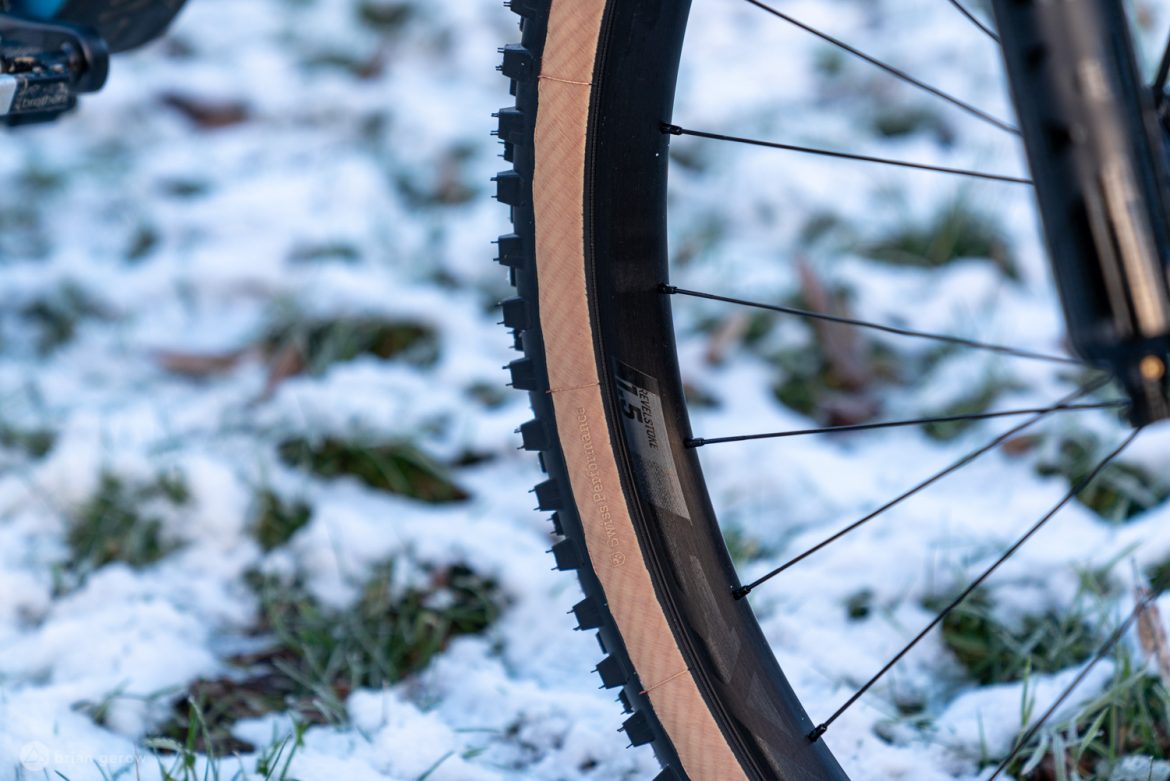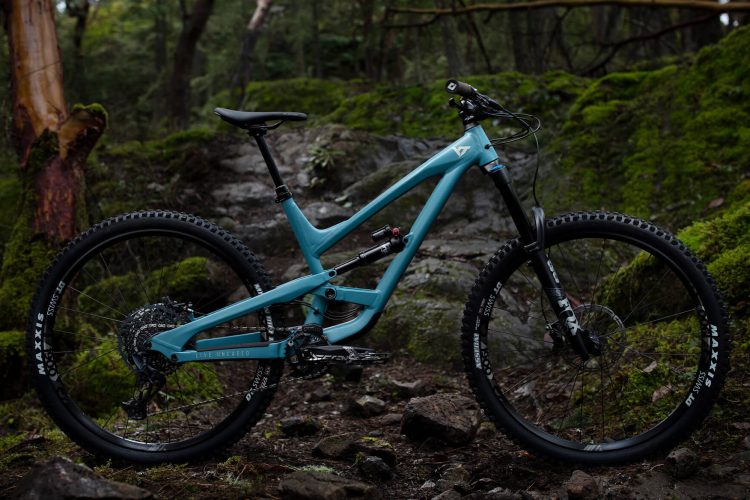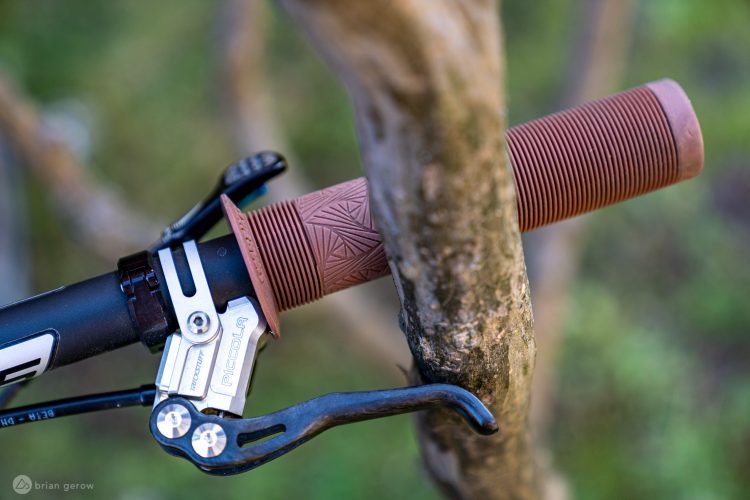
I recall some clear messages that my grandparents shared around saving up for things, and getting what you pay for. They’re all pretzel-wrapped deep in my brain. If we get things for free we won’t take good care of them, which is exactly what happens with some review gear.
Take these aluminum-rimmed Syncros Revelstoke 1.5 wheels for example. I have thoroughly trounced these rims over the past few months on some of the roughest tracks I’ve ever ridden, with three different bikes, and a few sets of tires. I definitely treat my personal wheels better, choosing smarter lines and taking fewer chances with rim-strikes and punctures. The short report: these wheels can take it.

The Revelstoke 1.5 rim has 28 symmetrically-drilled spoke holes front and rear, with a 30mm wide internal rim measurement to play well with 2.3-2.5″ tubeless tires. The 28 straight-pull spokes are laced in a three-cross pattern, with alloy nipples holding them in place. It’s not clear what brand or thickness the spokes are, but since Syncros is a Swiss company there is a clear horse to bet on.
These wheels are available in 29″ or 27.5″, with a Shimano HG or Micro Spline, or a SRAM XD freehub body. Weight for the 29″ set tested here is a feather from the brand’s reported 1944g.

The wheels come taped, with a solid set of valves to seat in their symmetrical inner rim. The tape has held up fairly well, save a few cuts here and there, with no air or sealant loss despite countless rim strikes.
The gravity tires I have tested on these rims set up tubeless without a hitch, and the bright green Syncros Eco Sealant has endured quite well. The brand says that this sealant is “latex-free, ammonium-free, and protein-free, and seals holes up to 6mm.” I can’t say for certain if the sealant has been put to work or not, as both tires seem to have plenty of liquid remaining. The fact that I didn’t have to plug a single puncture while testing these wheels likely says something about their flexibility under hard impacts, a properly designed rim wall that doesn’t easily cut tires, and the fact that I have only been testing dual-ply tires weighing 1200g and up.
These wheels come stock on a lot of Scott bikes, where quality control is clearly a high priority. Spoke tension is relatively uniform, and none of the spokes popped on the first ride, nor did they slap loosely yesterday. Tension remains consistent on both wheels, indicating a solid and well-planned build process. Both wheels are slightly out of true, as any would be after the rock dancing they’ve been through, and they only took a few minutes to straighten out.

The Syncros Boost hubs use Centerlock rotor adapters, which I prefer for swapping discs to use with different brake-pad compounds. Riders who travel often will also appreciate the convenience of removing a Centerlock rotor compared to a more tedious 6-bolt.
Instead of having a thin center diameter with taller spoke flanges, these hubs grow thicker from one side to the other, with the side where the designers wanted shorter spokes for increased stiffness being the thickest point. As a result, the hub shell feels super sturdy, and it’s also quite heavy. I didn’t de-lace these to weigh the hubs, but it’s clear that a good chunk of their 1944g overall heft is kept in the center where it won’t slow things down much.
With some quick math, the rear hub’s six pawls and 78 teeth give the the freehub about 4.6° of engagement, which is quite close to the 4° of the 1/1 hubs from Industry Nine. That close clicker in the rear wheel springs into action plenty fast for technical climbing, and anything faster will double the price tag.
The freehub gets a smooth pair of 6803 LH cartridge bearings, and there is plenty of factory grease inside to keep them rolling for a long while. Both hubs feel smooth and ready for another season of trail fun after their thorough winter flogging.
Swapping freehubs is relatively simple. The non-drive side has to be held in a soft vice or similar tool so that the drive side can be loosened with a cone wrench. From there the whole assembly slides apart like most other hubs.
In terms of weight and efficiency while climbing, the Revelstoke 1.5 wheels feel similar to a lot of the mid-tier DT Swiss wheels that often come stock on test bikes. They spin up as fast as most gravity-built alloy wheels. The pair feels plenty stiff to sprint on, and there’s sufficient lateral flex to keep them comfortable while not allowing the tire to contact the frame.
The build balance of these wheels is impressively displayed on descents, as they offer up that lateral movement to just the right degree. In plunge-y rock gardens when you want to wheels to give a little instead of transferring all lateral movement up the fork to your body, they take the edge off. Some of that tuned flex is likely due to the 28 spokes that create a slightly more compliant system than 32 would offer. With a well-studied parity of stiffness and forgiveness, Revelstoke 1.5 wheels track the earth just as well as a lot of more expensive alloy sets.
All that rock flogging couldn’t come without payment, and I did manage to bend the rear rim’s bead interface in two different places. The surprising bit is that those bends didn’t result in noticeable tire punctures or significant air loss. The tires still set up tubeless just as easily, and both of the dents will bang mostly straight between a few pieces of wood, a hammer, and some patience. Rear rims are a consumable component, and aggressive riders should budget to replace them once per season. This rim didn’t bend in any situation where another one would have held straight, and instead, it has impressively remained quasi-true and fully functional despite the bent bits.

Straight pull spoke lengths can be slightly harder to find at small bike shops in the mountains, though most good shops will have a few longer options that can be threaded with a spoke cutter. Alternatively, it’s easy enough to measure the spokes and pick up a few extras before heading to the backcountry.
If durability is above weight in your list of requirements for an affordable mountain bike wheel set, the Revelstoke 1.5 is worth considering. This set retails for €549.

























